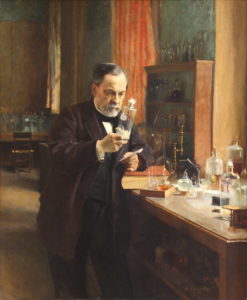
He was the father of several scientific breakthroughs and he has revolutionized medical history, as we know it today. Louis Pasteur’s scientific discoveries have resulted in countless lives being saved and has improved the lives of people all over the world.
Following are some of Pasteur’s most notable contributions to science and medicine.
Germ Theory of Diseases
Pasteur was known for his various contributions to medicine for his research on germs and pasteurization, due to which it was named after him. He put forward the germ theory of diseases, which greatly provided support to the Miasma theory of germs, which had prevailed from medieval times. Miasma theory stated that many diseases such as Chlamydia, plague and cholera were caused by bad air, but in 1800’s scientists like John Snow (known as the father of epidemiology) began to question the authenticity of this theory until Pasteur discovered that it is actually germs that cause these diseases and not “bad air”.
Pasteurization
Pasteur demonstrated that germs or microorganisms are responsible for causing diseases. Moreover, he also stated that microorganisms were also responsible for fermentation. He figured out how to prevent wine or beer from going sour by eliminating microbes and pathogens to prolong fluid quality. This is not sterilization, which is the complete absence of microbial organisms, but it reduces them to a point when they would be unable to turn any food sour. This discovery was so significant, it was named after him.
A Thriving Silk Industry in Europe
Pasteur singlehandedly saved the silk industry in Europe by finding out that silkworks carried a disease called Pebrine, caused by Nosema bombycis. He saved the French silk industry by screening the eggs of silkworms before they hatched to find out which were infected and which ones were not. This also prevented the disease from spreading to other parts of the industry as well.
Immunology
After proving how germs can be hazardous to human health, Pasteur wanted to do as much as he can to fight them. He started by applying a method of immunizing chickens against chicken cholera and anthrax. He used the notion that the less dangerous form of the disease causing immunity was not new and he wanted to develop a cure for anthrax and cholera. However, he was later accused of stealing the process from his nemesis Jean-Joseph-Henri Toussaint, who actually discovered the anthrax vaccine and never received any acclamations for his work.
Pasteur founded a scientific institute to bring forward a new age of medicine and to train other hopeful scientist in the field of science and discovery to continue his work and legacy. Today, The Pasteur Institute is one of the greatest and leading organizations for medical study in the world. It houses 100 research units and more than 2,700 people, including 500 scientists. Some of the most notable discoveries made by scientists working in the Pasteur institute are the antituberculosis vaccine, studying diphtheria, typhoid vaccine and many other achievements.
Although his life was not that glamorous, Louis Pasteur is revered for his contributions in the field of medical science for years to come.
